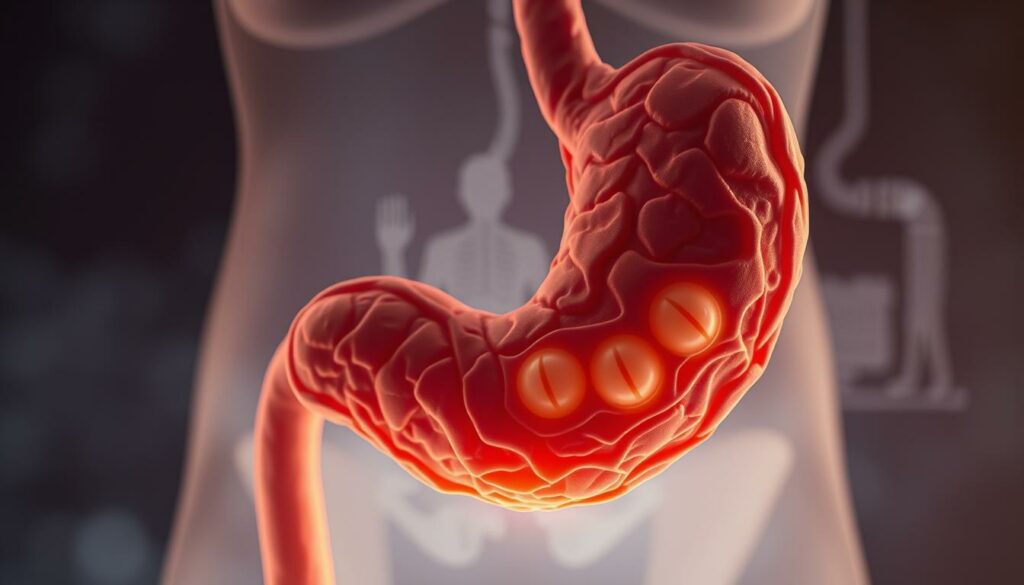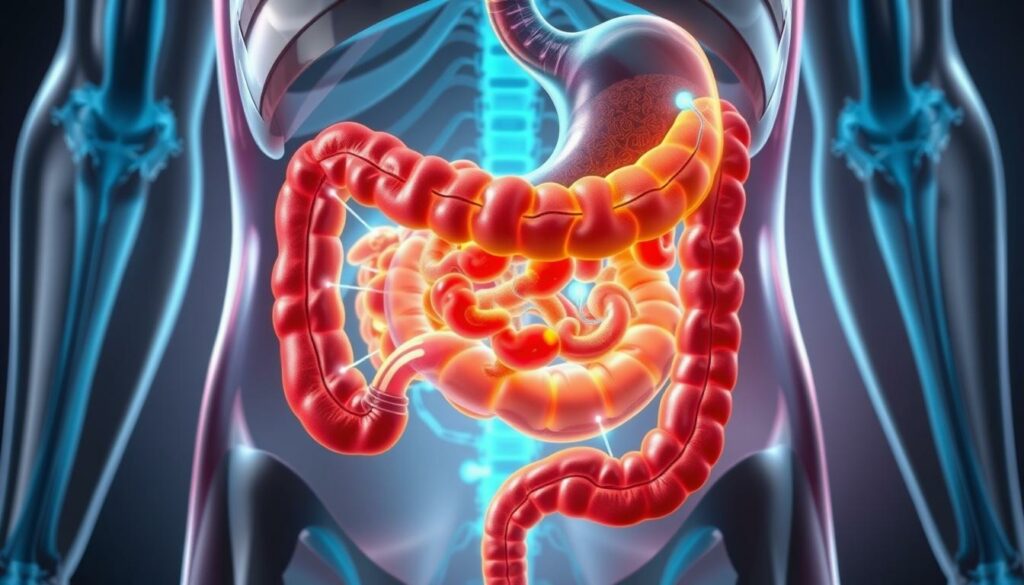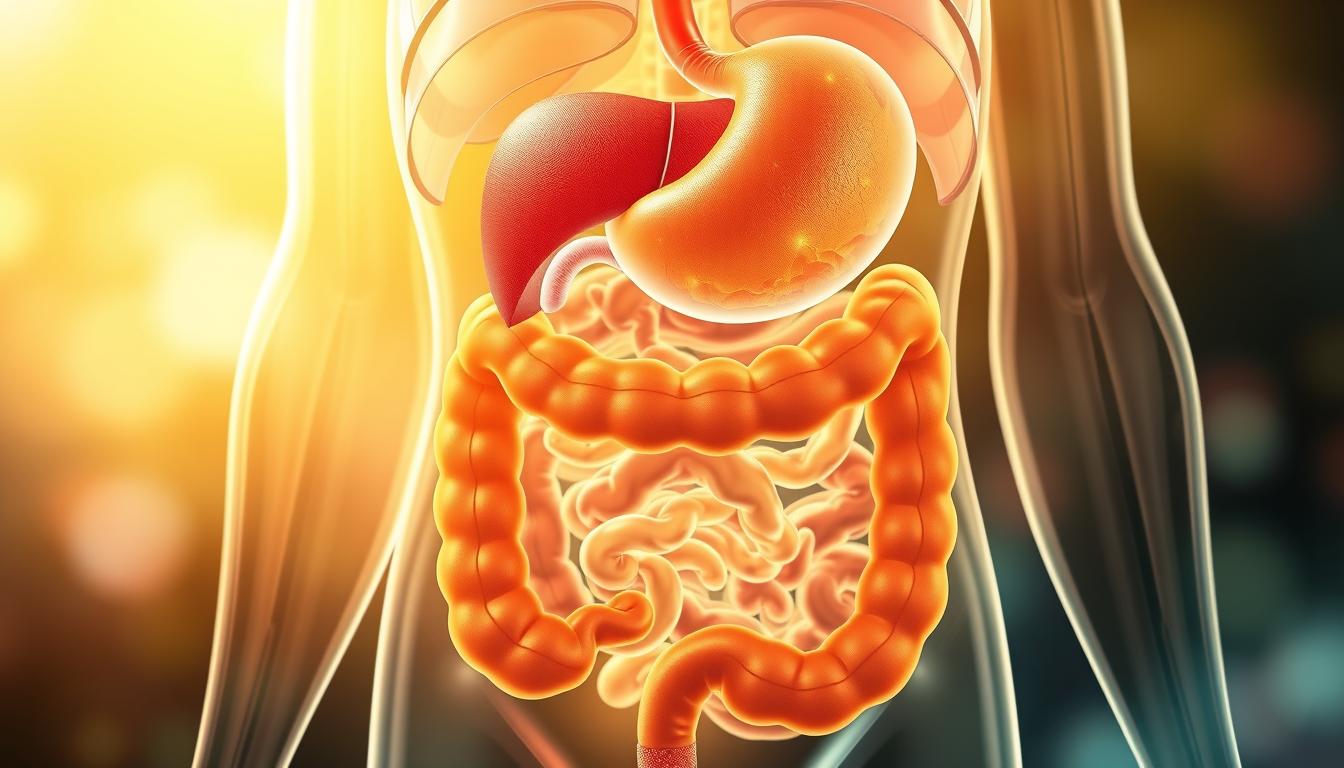Stomach Gurgling and Gas: What’s Causing It?
Do you often feel digestive issues like abdominal bloating or hear loud noises from your belly? You’re not alone. Many people deal with these symptoms, which can be embarrassing and affect daily life.
Stomach gurgling and gas can come from many things, like what you eat, stress, and health problems. Knowing what’s causing it is key to feeling better.
Key Takeaways
- Common causes of stomach gurgling and gas
- The role of diet in digestive health
- How stress affects the digestive system
- Potential underlying health conditions
- Simple changes to alleviate symptoms
Understanding Digestive Noises and Discomfort
Ever wondered about the sounds your stomach makes? These sounds can range from soft gurgles to loud rumbles. Knowing what they mean can help you feel better.

The Normal Sounds of Digestion
Digestion is a complex process. It breaks down food, absorbs nutrients, and gets rid of waste. The sounds you hear are usually normal and show your system is working right.
It starts in your mouth, where food gets chewed and mixed with saliva. Then, it goes down the esophagus into your stomach. There, it meets acids and enzymes. Next, it goes to the small intestine for nutrient absorption. Finally, it reaches the large intestine, where water is absorbed and waste is prepared for elimination.
How Gas Forms in Your Digestive System
Gas in your system comes from swallowed air and food breakdown by colon bacteria. Foods like beans, cabbage, and broccoli are gas producers. They contain sugars that bacteria in the colon break down, creating gas.
- Swallowed air can contribute to gas in the digestive system.
- Certain foods are more likely to be poorly digested and lead to gas production.
- The bacteria in your colon play a significant role in gas production through the breakdown of undigested food.
When Normal Becomes Problematic
While some digestive noises are normal, persistent or severe discomfort and noise can be indicative of an underlying issue. If you’re experiencing bloating, abdominal pain, or changes in bowel habits alongside the noises, it’s worth exploring the cause further. Conditions such as irritable bowel syndrome (IBS), small intestinal bacterial overgrowth (SIBO), or food intolerances could be contributing factors.
Understanding the difference between normal digestive noises and those that might signal a problem is crucial. If you’re concerned about your symptoms, keeping a food and symptom diary can help identify patterns and potential triggers, making it easier to manage your digestive health.
The Science Behind Stomach Gurgling and Gas
Ever wondered why your stomach makes noise or produces gas? It’s all about your digestive system. Knowing how it works can help you manage your gut health better.
What Is Borborygmi?
Borborygmi is the rumbling noise from gas and digestive fluids in your intestines. It’s normal but can be louder when you’re hungry or after eating certain foods. The word comes from the Greek “borborygmos,” which sounds like rumbling.

The Digestive Process Explained
Digestion breaks down food into smaller bits your body can use. It starts in your mouth, where food is chewed and mixed with saliva. Then, it goes to the stomach for acid and enzymes.
After that, it moves to the small intestine for nutrient absorption. The leftovers go to the large intestine, where water is absorbed and waste is prepared for elimination.
The digestive process moves food, gas, and fluids through your body. This movement can make noises like gurgling or rumbling. But, if these sounds are painful or accompanied by bloating, it might mean there’s a problem.
How Your Gut Microbiome Influences Gas Production
Your gut microbiome is key to digestion and gas. It’s filled with trillions of microorganisms that help break down food, make vitamins, and support your immune system.
- The gut microbiome affects gas production by fermenting undigested carbs.
- Different bacteria can make different amounts and types of gas.
- A healthy gut microbiome is vital for good digestion and less gas.
Things like diet, stress, and antibiotics can upset your gut microbiome balance. This can lead to more gas and discomfort. Keeping your gut microbiome healthy through diet and lifestyle can help with excessive gas and improve digestive health.
Common Causes of Digestive Discomfort
It’s important to know what causes stomach pain. Many things can upset your stomach. Finding out what they are is the first step to feeling better.
Food-Related Triggers
Some foods can make your stomach hurt, feel gassy, or bloated. Dairy, beans, and veggies like broccoli and cauliflower are common offenders. They’re hard for some people to digest, causing pain. Writing down what you eat can help figure out which foods are the problem.
Swallowed Air (Aerophagia)
Swallowing air, or aerophagia, can also upset your stomach. It happens when you eat fast, drink fizzy drinks, or chew gum. This air can make you feel bloated and uncomfortable. Being careful about how you eat can help avoid swallowing air.
Stress and Anxiety Effects on Digestion
Stress and anxiety can really mess with your stomach. They make your body react in ways that make digestion worse. Stress can slow down digestion, leading to discomfort and gas. Trying stress-reducing activities like meditation or deep breathing can help.
Knowing what causes your stomach problems is the first step to feeling better. It’s a start towards finding relief from belching and other discomforts.
Problematic Foods That Increase Gas Production
If you’re feeling gassy, it’s key to know which foods might be the culprits. Some foods are more likely to make you feel bloated because of their makeup and how they’re digested.
Beans and Legumes
Beans and legumes, like lentils and chickpeas, can make you feel gassy. This is because they’re full of complex carbohydrates and fiber. These aren’t fully broken down in your small intestine and get fermented in your colon, leading to gas.
To lessen the gas, try soaking dried beans before cooking. Using a pressure cooker can also help. Adding ginger or asafoetida to your dishes can ease digestion too.
Cruciferous Vegetables
Vegetables like broccoli and cauliflower have raffinose, a tough-to-digest sugar. When they’re broken down by bacteria in your colon, they can cause gas.
Cooking these veggies can make them easier to digest. Adding digestive-friendly spices like turmeric can also help cut down on gas.
Carbonated Beverages
Drinking fizzy drinks like soda can make you swallow air, leading to gas. The carbonation process involves dissolving CO2 gas in water, causing bloating.
Choosing non-carbonated drinks or letting fizzy drinks go flat before drinking them can help reduce gas.
Artificial Sweeteners and Sugar Alcohols
Artificial sweeteners and sugar alcohols, like sorbitol, aren’t fully absorbed by your body. When they reach your colon, bacteria ferment them, producing gas.
Being careful about the ingredients in sugar-free products and limiting these sweeteners can help lessen gas and bloating.
Knowing which foods can cause gas and making a few diet changes can help ease abdominal bloating. This can improve your overall digestive comfort.
Lifestyle Habits That Worsen Stomach Gurgling
Your daily habits can really affect your digestive health, causing stomach gurgling and gas. Some lifestyle choices can make things worse. It’s key to spot and change these habits to feel better.
Eating Too Quickly
Eating fast can make you swallow more air, which leads to stomach gurgling. When you rush, you don’t chew well. This puts extra stress on your digestive system. To fix this, eat slowly and mindfully, enjoying your food and chewing well before swallowing.
Chewing Gum and Hard Candy
Chewing gum and hard candy make you swallow more air, causing gas and gurgling. It’s tough to stop, but cutting down or stopping them can ease discomfort. If you must chew gum, pick sugar-free kinds to avoid extra sugar.
Smoking and Alcohol Consumption
Smoking and drinking too much alcohol harm your digestive health. Smoking makes you swallow more air, and alcohol irritates your stomach. Try to stop smoking and drink less to ease stomach gurgling and boost digestive health.
Sedentary Behavior After Meals
Sitting or lying down after meals slows digestion and causes discomfort. But, moving around helps digestion and eases gas. Try to take a short walk or do some light exercise after eating to aid digestion.
By making these simple changes, you can cut down on stomach gurgling and gas. This improves your digestive health and comfort.
Medical Conditions Associated with Excessive Gas
Many medical conditions can lead to too much gas. Knowing these can help you feel better. If you’re always uncomfortable, it might be due to an underlying issue.
Irritable Bowel Syndrome (IBS)
IBS affects the large intestine, causing pain, bloating, and bowel changes. Gas and bloating are common in IBS. To manage it, you might need to change your diet and handle stress better.
Small Intestinal Bacterial Overgrowth (SIBO)
SIBO happens when bacteria grow too much in the small intestine. This leads to a lot of gas, bloating, and pain. Treatment usually includes antibiotics and changing your diet.
Celiac Disease and Gluten Sensitivity
Celiac disease damages the small intestine when you eat gluten. It can cause bloating and gas. Gluten sensitivity also leads to similar symptoms but isn’t an autoimmune disease. Both need a gluten-free diet.
Inflammatory Bowel Diseases
Diseases like Crohn’s and ulcerative colitis cause long-term inflammation in the gut. Symptoms include too much gas, pain, and bowel changes. Managing these conditions might involve medication, lifestyle changes, and sometimes surgery.
Knowing about these conditions can help you find the reason for your gas. If your symptoms don’t go away, see a doctor for help.
How to Identify Your Personal Triggers
Finding out why your stomach gurgles and gets gassy is like solving a mystery. Knowing what makes your stomach upset is the first step to feeling better. It’s all about taking care of your digestive health.
Creating an Effective Food and Symptom Journal
Keeping a food and symptom journal is a great way to find your triggers. Write down what you eat and drink, and any stomach issues you have. This helps you see patterns between certain foods and your stomach discomfort.
- Note the time and date of each meal and snack.
- Record the foods consumed, including portion sizes.
- Document any symptoms, such as bloating, gas, or stomach pain.
- Rate the severity of your symptoms.
Conducting an Elimination Diet
An elimination diet is a powerful tool for finding food triggers. It means removing certain foods from your diet for a while, then adding them back one at a time to see how you react. Common foods to avoid include dairy, gluten, and high-FODMAP foods.
When you do an elimination diet, be careful and patient. Start by removing foods that are likely to cause problems and watch your symptoms. Slowly add foods back in, paying attention to any changes in your symptoms. This helps you figure out which foods upset your stomach.
Working with Healthcare Providers for Testing
At times, finding your triggers needs a doctor’s help. Your doctor might suggest tests to find out if you have any underlying issues. These could be tests for food allergies, Small Intestinal Bacterial Overgrowth (SIBO), or other stomach problems.
Working with your doctor and keeping a detailed journal helps you understand your digestive problems better. This team effort is crucial for finding good flatulence remedies and improving your digestive health.
Effective Remedies for Stomach Gurgling and Gas
You don’t have to live with stomach gurgling and gas. Many remedies can help you feel better. Understanding your options, from herbal remedies to self-care, is key.
Herbal Solutions That Calm Digestion
Herbal teas and supplements have been used for centuries to soothe digestion. Some of the most effective herbs include:
- Peppermint: Known for its ability to ease digestion and reduce symptoms of IBS.
- Ginger: Helps in reducing inflammation and alleviating nausea.
- Chamomile: Soothes the digestive tract and promotes relaxation.
These herbal solutions can be consumed as teas, capsules, or added to meals as supplements. Always consult with a healthcare provider before starting any new herbal remedy.
Over-the-Counter Medications
For immediate relief from excessive gas and stomach gurgling, over-the-counter (OTC) medications can be highly effective. Products containing simethicone help break up gas bubbles in the stomach, making it easier to pass gas and relieve discomfort.
Common OTC medications include:
- Antacids: Help neutralize stomach acid.
- Simethicone-based products: Aid in breaking up gas bubbles.
- Activated charcoal: May help absorb gas, though its effectiveness varies.
Gentle Abdominal Massage Techniques
Gentle abdominal massage can help stimulate digestion and relieve gas buildup. Techniques include:
- Circular motions: Gently massage your abdomen in a circular motion to help stimulate digestion.
- Light pressure: Apply light pressure to avoid discomfort while still stimulating the digestive tract.
Regular massage can also help reduce stress, which is often a contributing factor to digestive discomfort.
Heat Therapy Applications
Applying heat to the abdomen can help relax the muscles and improve digestion. Using a warm heating pad or a hot water bottle wrapped in a towel can provide relief from cramps and discomfort associated with gas.
Tips for using heat therapy:
- Use a comfortable temperature to avoid burns.
- Limit application to 15-20 minutes at a time.
- Repeat as needed throughout the day.
By incorporating these remedies into your daily routine, you can find effective relief from stomach gurgling and gas. Always consult with a healthcare professional if your symptoms persist or worsen.
Dietary Strategies to Reduce Digestive Discomfort
Choosing the right foods is key to lessening digestive problems and boosting gut health. By following certain dietary tips, you can cut down on belly bloating and better your digestive health.
Implementing a Low-FODMAP Diet
A Low-FODMAP diet is great for those with ongoing digestive issues. FODMAPs are carbs that some find hard to digest. By cutting out high-FODMAP foods and then adding them back, you can figure out what bothers you.
It’s best to follow this diet with the help of a doctor or dietitian. They ensure you get all the nutrients you need. Foods high in FODMAPs include some fruits, veggies, grains, and dairy.
Proper Hydration Practices
Drinking enough water is vital for good digestion. Water helps break down nutrients and fiber, making them easier for your body to use. It also helps prevent constipation by softening stool and keeping bowel movements regular.
To stay hydrated, drink at least eight glasses of water a day. Adjust this based on how active you are and where you live. Also, add hydrating foods like cucumbers, celery, and watermelon to your meals.
Fiber Adjustment Techniques
Fiber is important for gut health, helping food move through your system and keeping bowel movements regular. But adding too much fiber at once can upset your stomach.
To increase fiber safely, start by adding small amounts of high-fiber foods like fruits, veggies, and whole grains. This lets your gut adjust. It’s also good to mix different types of fiber to keep your diet balanced.
Mindful Eating Approaches
Mindful eating means focusing fully on eating and drinking, both physically and emotionally. Eating slowly, enjoying your food, and listening to your hunger and fullness signals can lessen digestive problems and make eating more enjoyable.
Mindful eating can also help you spot food triggers and build a healthier food relationship. Begin by removing distractions during meals, like turning off the TV or eating away from your computer.
When to Seek Medical Attention
Stomach gurgling now and then is normal. But, some symptoms mean you need to see a doctor fast. Severe pain, vomiting, or bloody stools are red flags. They could point to a serious problem that needs quick medical help.
Warning Signs That Require Immediate Care
Don’t ignore certain signs of gastrointestinal trouble. These include:
- Severe abdominal pain that doesn’t go away
- Vomiting blood or bloody stools
- A fever over 101.5°F (38.6°C)
- Signs of dehydration, like too much thirst, dark urine, or feeling dizzy
If you or someone you know has these symptoms, get medical help right away.
Diagnostic Tests Your Doctor May Recommend
Your doctor might suggest several tests to find out why you’re experiencing stomach gurgling and gas. These could be:
- Endoscopy to look inside your digestive tract
- Colonoscopy to check your colon
- Imaging tests like X-rays, CT scans, or MRI scans to see your digestive system
These tests help your doctor figure out what’s causing your symptoms. Then, they can create a treatment plan for you.
Treatment Options for Chronic Issues
If you have a chronic gastrointestinal problem, there are treatments. These can include:
- Dietary changes to avoid foods that trigger symptoms and manage them
- Medications to lessen symptoms like bloating, gas, or pain
- Lifestyle modifications like stress management or changes in how you eat
With your doctor’s help, you can create a plan to manage your symptoms. This can greatly improve your life quality.
Building Your Personalized Gut Health Plan
Now that you’ve learned about stomach gurgling and gas, it’s time to make a plan for better gut health. Start by figuring out what triggers your issues. This could be food, lifestyle, or health problems.
Try a low-FODMAP diet, eat mindfully, and drink plenty of water to ease discomfort. Herbal remedies like peppermint oil or chamomile tea can also help calm your stomach. If problems persist, talk to your doctor to check for conditions like IBS or SIBO.
By making smart choices and changes, you can lessen flatulence and boost your digestion. Take charge of your gut health by paying attention to what you eat, how you live, and your stress levels. With a plan tailored to you, you can have a more comfortable and healthy digestive system.



